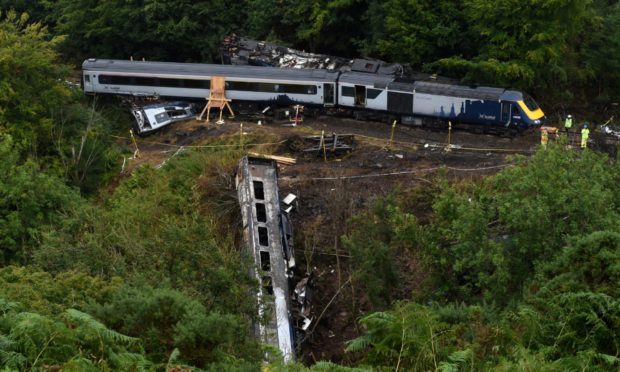An expert has called for rail bosses to “react quickly” to restore consumer confidence as the line between Aberdeen and Dundee finally reopens following the fatal derailment at Stonehaven this summer.
The line has been closed off since August 12 when the 6.38am ScotRail Aberdeen to Glasgow service hit a landslip, resulting in the death of driver Brett McCullough, conductor Donald Dinnie and passenger Christopher Stuchbury.
Gareth Dennis, a railway engineer and writer from York who is originally from Inverurie, argued that getting the train is still one of the safest ways to travel.
Speaking ahead of the track returning to use for the first time in three months today, he expressed hopes that people would not be discouraged from using the mode of transport.
He said: “Consumer confidence may well have taken a knock, but the reality remains that Britain’s railways are among the safest in Europe, and are the safest way to move around on land – you’re much safer on the train than even walking to or driving to the station.
“In order to deal with the knock in confidence, which is totally understandable after a tragic incident like this, the rail industry needs to show that it has reacted quickly and learned the lessons that have been explored already as a result of the incident.
“It has to be a case that the industry can prove it has made changes that further improve safety in the interim, and the industry must be swift and clear in its response to the crash report when it does eventually get published.”
As a result of the crash at Carmont, just outside of Stonehaven, the track, a nearby bridge, embankments and drainage systems in the area were severely damaged, and work had been ongoing since September to fix all of the issues.
Following the incident, Network Rail introduced a number of additional safety measures, including the inspection of hundreds of sites across the country with high-risk slopes alongside the tracks.
Two taskforces, led by independent experts, were also launched by Network Rail, as part of the organisation’s long-term response to climate change, and the challenge of maintaining its earthworks throughout the nation, many of which date back to the Victorian era.
Two investigations, one by the Rail Accident Investigation Branch and one by the police, British Transport Police and the Office of Road and Rail are being conducted.
